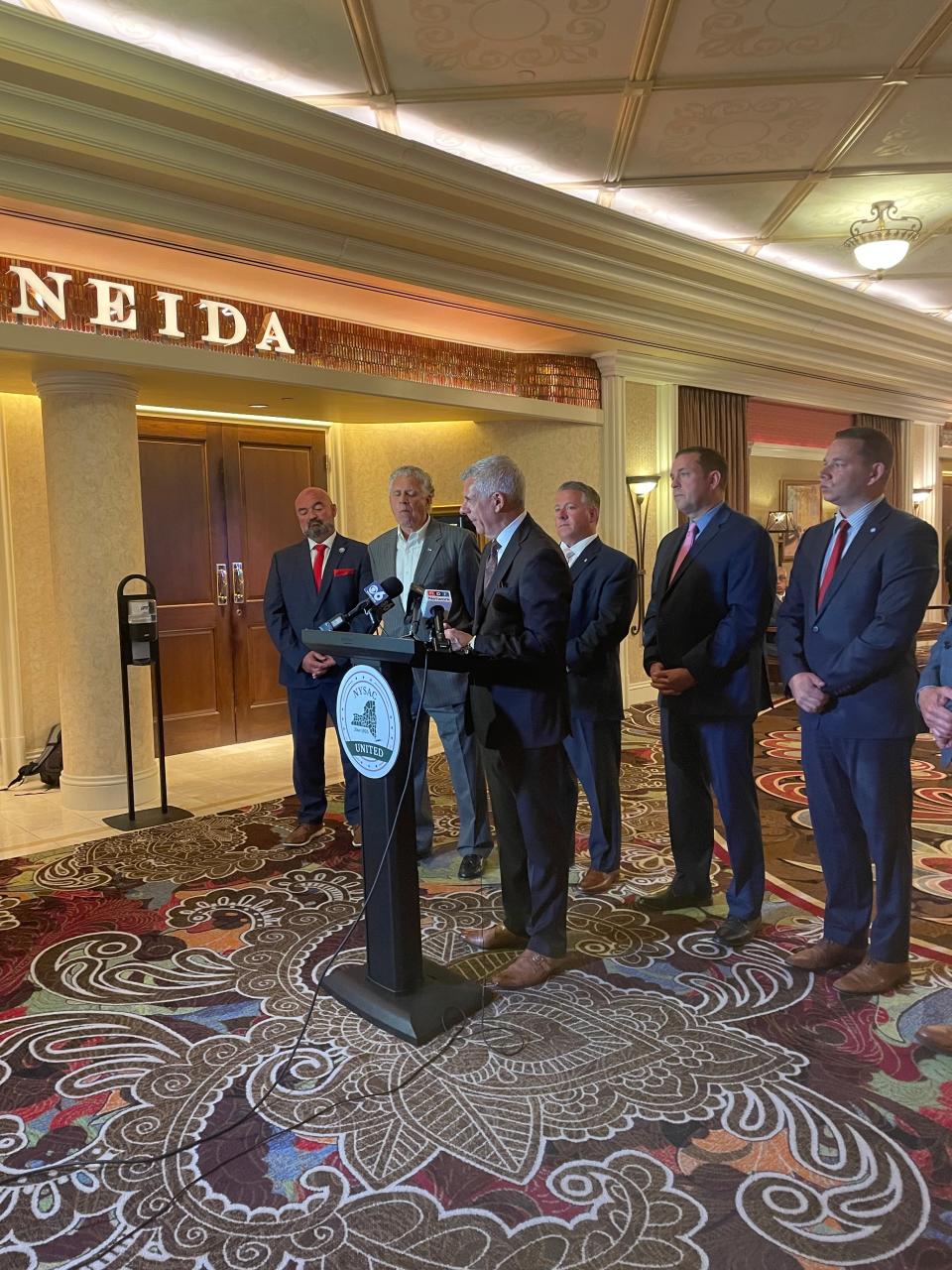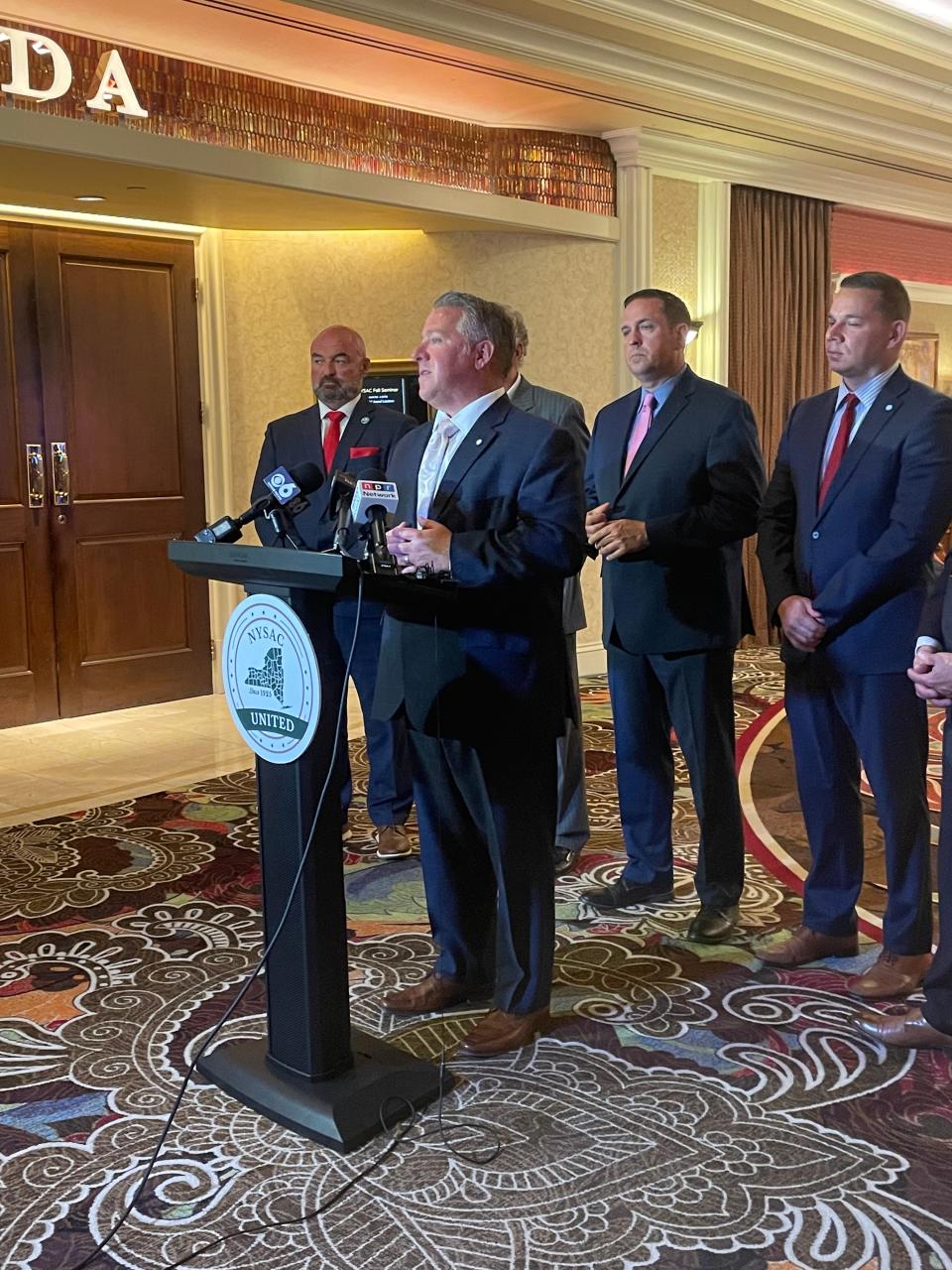County executives address NY issues with migrants, local elections, unfunded mandates
A group of county executives took time at the New York State Association of Counties’ fall seminar Thursday at Turning Stone to address their varied concerns with the state government.
The group presented a unified front in addressing three issues: the influx of migrants arriving in upstate New York counties, a bill passed by the state legislature to move county and town elections to even years rather than odd years and what they referred to as the state intercepting funds from counties to pay for Medicaid.

On migrants
Each county executive present at the press conference issued a state of emergency declaration or executive order addressing asylum seekers earlier this year. These orders prohibit municipalities from contracting with businesses or individuals to transport migrants to their counties and house them there.
“What we're seeing in New York State right now is an epic disaster,” said Orange County Executive Steven M. Neuhaus, a Republican. “The immigration policy is a national embarrassment. There is no cooperation between the White House, the governor in New York State and the mayor. They're all pointing fingers at each other. The situation is getting worse and worse. Thousands of asylum seekers living in all sorts of makeshift shelters all over New York City, sending them to counties, creating chaos. No county wants the asylum seekers sent to them if they're going to be parked in hotels for 18 to 24 months.”
Democratic Albany County Executive Daniel P. McCoy was inaugurated as NYSAC’s new president earlier Thursday afternoon. He agreed that neither the state nor federal government has stepped up with a plan to address the arrival of migrants.
“It's left to the localities to take care of this crisis, and we need to treat it like a national disaster,” McCoy said.
McCoy said that he has almost 700 migrants in his county of 320,000 constituents. The presence of those migrants is straining the county’s capacity to offer services such as food pantries and housing assistance, he said.
“We want to roll out the carpet, we want to work, and we have, but we need a plan,” McCoy said. “And that plan really has not materialized.”
Oneida County Executive Anthony J. Picente Jr. and and fellow Republican Chautauqua County Executive Paul M. Wendel Jr. responded to backlash they have received over their ordered states of emergency.
Picente said the federal government needs to close the southern border to stem the flow of migrants and asylum-seekers entering the country.
Picente finds it offensive that individuals and organizations in Oneida County have accused him of being exclusionary. He said that his executive order was about grappling with the county’s capacity to house and support the volume of migrants.
“The Center in Utica has, for 30 years, done it the right way, helping immigrants come to us,” Picente said. “There are 46 languages spoken in the city of Utica. So it’s not about being non-inclusive, it’s about dealing with what we can.”
Faith leaders in Utica have spoken out against Picente’s order from May of this year barring hotels and shelters from accepting undocumented immigrants.
“The county exec does not speak for me, and I do not think he speaks for most of us,” said Rev. Karen Brammer, head of Unitarian Universalist Church of Utica, in May. “Most of us know that Utica is a better place due to the diversity and hard work of waves of immigrants who have made Utica their home.”
Wendel noted that Chautauqua County had indeed admitted migrants prior to his May emergency order. He said he takes issue not with migrants arriving, but with government entities paying businesses to house migrants without a long-term plan.
“They're setting many of these people up for failure, because they can't work,” Wendel said. “They're being sent to counties to languish there with an inability to do things for themselves. They're encouraging people to break the labor laws in the state of New York and the federal government because they have to provide for their families. They want to make sure that they're doing the right thing. They want a fresh start. So it's unique that individuals in other organizations and counties have called us repugnant and unconstitutional for what we did.”

On moving elections
Regarding the bill to move county and town elections to even years, the executives called on the state government to stop interfering with their local elections and for Gov. Kathy Hochul to veto the bill.
Onondaga County Executive Ryan McMahon, a Republican, said that legislators passed the bill in the dark of night without following proper procedures.
He pointed out that cities, including New York City, are exempt from the change in election years, and said that legislators representing the city should have abstained from the vote.
“People in our communities don't even realize they're trying to steal their local election day and water down the importance of the local elections, which are closest to the people,” McMahon said.
Picente said that the reasons the state government has given for shifting county and town elections to even years are lies. While state officials have said it is a cost-cutting measure, Picente said it will not save any money because counties will still have to run elections every year.
This year, Picente noted his own race as well as races for district attorney, mayors and more are on the ballot.
“Why did they do it?” Picente said. “They did it so that all of us legislators and others wanting to run would have to make a choice if we wanted to run for statewide office. Plain and simple. It's ridiculous. It’s political. And the fact that it doesn't affect New York City, again, I can’t stress it enough – why not? Why are you not changing your elections?”
McMahon said that while some argue that the increased voter turnout typically seen during even-year elections would be beneficial, he did not understand why cities such as New York would exempt themselves from such a purported benefit.
“If their arguments are sound, then why didn’t they go through the right process?” McMahon said. “But they never did that, because their arguments aren't sound.”
On unfunded mandates
The executives argued that while they would ordinarily be able to pay for federal mandates that increase costs for state and local government entities, such as the Enhanced Federal Medical Assistance Percentage (E-FMAP), the state is intercepting federal funds designated for counties to cover the state’s Medicaid costs.
Thus, they referred to E-FMAP as an unfunded mandate.
“We are being shortchanged by the state of New York of money that belongs to our taxpayers and our budgets,” Picente said.
McCoy and Wendel said it’s almost as if they are being punished for their ability to manage their county budgets.
“Inevitably what's happening is, because of our hard work, our fiscal responsibility, the governor is feeling it’s in her power to take that money from the counties,” Wendel said. “They’re asking the counties to dip into their pockets – ‘Pay us, help us, because we can't manage our own coffers in the state government.’ This has to stop.”
Gov. Hochul’s office did not immediately respond to a request for comment.
This article originally appeared on Observer-Dispatch: NY county executives address concerns regarding state government

